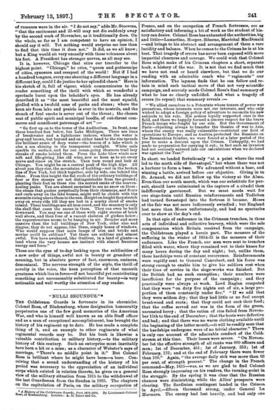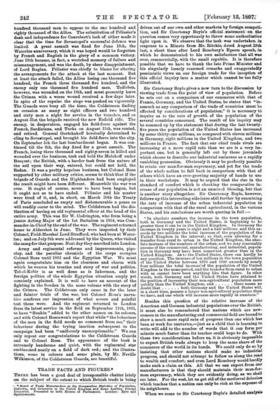"NULLI SECUNDITS."*
THE Coldstream Guards is fortunate in its chronicler. Colonel Ross, of Bladensburg, whose designation honourably perpetuates one of the few good memories of the American War, and who is himself well known as an able Staff officer and as a man of exceptional accomplishment, has brought the history of his regiment up to date. He has made a complete thing of it, and an example to other regiments of what regimental records may be. But his book is likewise a valuable contribution to military history,—to the military history of this century. Such an enterprise must inevitably have been a hit or a miss ; as a character of Webster's says of marriage, "There's no middle point in it." But Colonel Ross is brilliant where he might have been—a bore. Con- ceiving that a sound understanding of the history of his period was necessary to the appreciation of an individual corps which existed in relation thereto, he gives us a general view of the military situation from 1815 to the withdrawal of the last Guardsman from the Soudan in 1885. The chapters on the capitulation of Paris, on the military occupation of • 4 History of the Coldatream Guard?, from 1815-1895. By Lieutenant-Colonel Roe, of Bladensburg. London : A. D. Jones and Co.
France, and on the occupation of French fortresses, are as satisfactory and informing a bit of work as the student of his- tory can desire. Colonel Ross has exhausted the authorities, big and little—Lamartine, Hooper, Siborne, Marechal MacDonald —and brings to his abstract and arrangement of them a rare lucidity and balance. When he comes to the Crimea he is at his best. That tragedy of errors has never been exposed with more impartial clearness and courage. We could wish that Colonel Ross might make of his Crimean chapters a short, separate book, a history of the war. It is not that we find much that we have not read or heard elsewhere, but that we do our reading with an admirable coach who " regiments " our information. The layman finds that he can follow and re- tain in mind each tactical move of that not very scientific campaign, and scarcely needs Colonel Ross's final summary of what he has so clearly unfolded. And what a tragedy of errors (to repeat) that summary reveals :—
"We allied ourselves to a Potentate whose tenure of power was precarious, whose interests were not our interests, and who only wished to adopt a foreign policy of adventure to reconcile his new subjects to his rule. His armies loyally supported ours in the field, and there we happily formed a sincere respect for the brave French troops who fought by our side. But the Government of Paris—objecting always to transfer the theatre of war to Asia, where the enemy was really vulnerable—restricted our field of operations to Europe ; and as Austria protected the Russians on the Bessarabian frontier, we were forced at a later period of the year to make a descent upon the Crimea. Unhappily, we had made no preparation for carrying it out ; in fact such an invasion had not seriously entered into our calculations when we declared war against the Tsar."
In short. we landed fortuitously "at a point where the road led to the north side of Sevastopol," but where there was not a harbour to form a base. We advanced without a base, and winning a battle, arrived before our objective. Giving in to St. Arnaud, we did not follow up the victory at the Alma, Even then our south march, which was our substitute for pur- suit, should have culminated in the capture of a citadel then indifferently garrisoned. But we must needs wait for our siege-train until Russian reinforcements and Todlebeiz had turned Sevastopol into the fortress it became. Moses at the fair was not more ludicrously swindled ; but England lost more than Moses unfortunately, and had no spectacles over to show at the day's end.
In that epic of endurance in the Crimean trenches, in those acts of individual and collective bravery, which were the sole compensation which Britain received from the campaign, the Coldstream played a heroic part. The measure of the suffering in the winter of 1854-55 is the measure of their endurance. Like the French, our men were sent to trenches filled with water, where they remained wet to their knees for many hours during the day and night ; but, unlike them, these hardships were of constant recurrence. Reinforcements were rapidly sent to General Canrobert, and his force was strong enough to enable him to give his soldiers rest when their time of service in the siege-works was finished. But the British had no such exemption; their numbers were insufficient for the purpose of the campaign ; and they practically were always at work. Lord Raglan computed that they were "on duty five nights out of six, a large pro- portion of them constantly under fire." "If we add that they were seldom dry ; that they had little or no fuel except brushwood and roots ; that they could not cook their food; that the coffee served out was in the form of the green, unroasted berry ; that the ration of rice failed from Novena.. her 15th to the end of December ; that the boots were defective and bad ; and that there was no warm clothing available until
the beginning of the latter month,—it will be readily seen that the hardships undergone were of no trivial character." There is only one account of the admirable conduct of the Cold, stream at this time. Their losses were severe. "On Novemp
ber 1st the effective strength of all ranks was 600 officers and men; let of December, 451; 1st of January, 353; 1st of February, 173; and at the end of February there were fewer than 100." Again, "the average daily sick was more than 63 per cent, of strength present." The change in the French command—May, 1855—was, as we are glad to find Colonel Ross strongly impressing on his readers, the turning-point in the struggle. By the spring it was clear that the Russian chances were diminishing, while the Allies' prospects were clearing. The Sardinian contingent landed in the Crimea in April,—fifteen thousand strong, under General La Marmora. The enemy had lost heavily, and had only one
hundred thousand men to oppose to the one hundred and eighty thousand of the Allies. The substitution of Pelissier's dash and independence for Canrobert's lack of either made it clear that the time for Sevastopol's successful defence was limited. A great assault was fixed for Jane 18th, the Waterloo anniversary, which it was hoped would be forgotten by French and English in the glory of a common victory. Jane 18th became, in fact, a wretched memory of failure and mismanagement, and was the death, by sheer disappointment, of Lord Raglan. Pelissier was chiefly to blame for altering the arrangements for the attack at the last moment. But at least the attack failed, the Allies losing one thousand five hundred, the French three thousand five hundred, and the enemy only one thousand five hundred men. Todleben, however, was wounded on the 18th, and must presently leave the Crimea with a worse wound received a few days later. In spite of the repulse the siege was pushed on vigorously. The Guards were busy all the time, the Coldstream finding on occasion as many as eight officers and two hundred and sixty men a night for service in the trenches, and on August 31st the brigade received the new Enfield rifle. The enemy, in desperation, engaged his field-force against the French, Sardinians, and Turks on August 15th, was routed, and retired. General Gortchakoff heroically determined to cling to Sevastopol, and brought his field-force into the city. On September 5th the last bombardment began. It was con- tinued till the 8th, the day fixed for a great assault. The French, losing three thousand and eighty-seven in killed and wounded over the business, took and held the Malakoff under Bosquet ; the British, with a harder task from the nature of the soil upon their way, entered, but could not hold, the Redan. It was a pretty hopeless business, but Colonel Ross supported by other military critics, seems to think that if the brigade of Guards and the Highlanders had been employed the result might have been different. Meanwhile the war was over. It ought of course, never to have been begun, but it ought not so to have ended. Pelissier and his master were tired of it, and, in short, on March 30th the Treaty of Paris concluded as empty and dishonourable a peace as will readily occur to the mind. The Coldstream had the dis- tinction of having an old regimental officer at the head of the entire army. This was Sir W. Codrington, who from being a junior Acting Major of the 1st Battalion in 1854, was Com- mander-in-Chief by the end of the war. The regiment returned home to Aldershot in June. They were inspected by their 'Colonel, Field-Marshal Lord Strafford, who had been at Water- loo; and on July 8th were addressed by the Queen, who visited the camp for that purpose. Next day they marched into London.
Army and regimental reforms and improvements, pipe- clay, and the peculiar chronicle of the corps occupies Colonel Ross until 1882 and the Egyptian War. We must again congratulate him on the clearness and charm with which he weaves his treatise and story of war and politics. Tel-el-Kebir is as well done as is Inkerman, and the foreign politics of the whole Egyptian situation amply yet concisely explained. It is well to have an account of the fighting in the Soudan in the same volume with the story of the Crimea. The Coldstream only came in for the later and fainter trials of the war, but Colonel Ross's narra- tive confirms our impression of what severe and painful test these were. And the regiment returned to London from its latest service in the field on September 11th., 1885, to have " Suakin " added to the other names on its colours, and with Colonel Boseawen's report that while" the behaviour of the men in the field needs no comment from me," their behaviour during the trying inaction subsequent to the campaign had been "uniformly unexceptionable." We can only repeat our congratulations to the Coldstream Guards and to Colonel Ross. The appearance of the book is extremely handsome and quiet, with the regimental star emblazoned neatly on a field of dark red ; and the illustra- tions, some in colours and some plain, by Mr. Neville Wilkinson, of the Coldstream Guards, are beautiful.



































 Previous page
Previous page